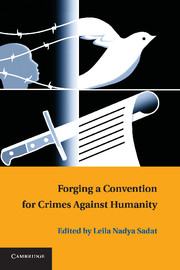Book contents
- Frontmatter
- Contents
- Figures and Maps
- Crimes Against Humanity Initiative: Steering Committee
- Biographies of Contributors
- Foreword
- Preface and Acknowledgments
- Crimes Against Humanity and the Responsibility to Protect
- 1 History of Efforts to Codify Crimes Against Humanity
- 2 The Universal Repression of Crimes Against Humanity before National Jurisdictions
- 3 Revisiting the Architecture of Crimes Against Humanity
- 4 The Bright Red Thread
- 5 Gender-Based Crimes Against Humanity
- 6 “Chapeau Elements” of Crimes Against Humanity in the Jurisprudence of the UN Ad Hoc Tribunals
- 7 The Definition of Crimes Against Humanity and the Question of a “Policy” Element
- 8 Ethnic Cleansing as Euphemism, Metaphor, Criminology, and Law
- 9 Immunities and Amnesties
- 10 Modes of Participation
- 11 Terrorism and Crimes Against Humanity
- 12 Crimes Against Humanity and the International Criminal Court
- 13 Crimes Against Humanity and the Responsibility to Protect
- 14 Re-enforcing Enforcement in a Specialized Convention on Crimes Against Humanity
- 15 Why the World Needs an International Convention on Crimes Against Humanity
- Appendices
- I Proposed International Convention on the Prevention and Punishment of Crimes Against Humanity
- II Proposition de Convention Internationale sur la Prévention et la Répression des crimes contre l'humanité
- III A Comprehensive History of the Proposed International Convention on the Prevention and Punishment of Crimes Against Humanity
- Testimonials and Endorsements
- Index
III - A Comprehensive History of the Proposed International Convention on the Prevention and Punishment of Crimes Against Humanity
Published online by Cambridge University Press: 01 June 2011
- Frontmatter
- Contents
- Figures and Maps
- Crimes Against Humanity Initiative: Steering Committee
- Biographies of Contributors
- Foreword
- Preface and Acknowledgments
- Crimes Against Humanity and the Responsibility to Protect
- 1 History of Efforts to Codify Crimes Against Humanity
- 2 The Universal Repression of Crimes Against Humanity before National Jurisdictions
- 3 Revisiting the Architecture of Crimes Against Humanity
- 4 The Bright Red Thread
- 5 Gender-Based Crimes Against Humanity
- 6 “Chapeau Elements” of Crimes Against Humanity in the Jurisprudence of the UN Ad Hoc Tribunals
- 7 The Definition of Crimes Against Humanity and the Question of a “Policy” Element
- 8 Ethnic Cleansing as Euphemism, Metaphor, Criminology, and Law
- 9 Immunities and Amnesties
- 10 Modes of Participation
- 11 Terrorism and Crimes Against Humanity
- 12 Crimes Against Humanity and the International Criminal Court
- 13 Crimes Against Humanity and the Responsibility to Protect
- 14 Re-enforcing Enforcement in a Specialized Convention on Crimes Against Humanity
- 15 Why the World Needs an International Convention on Crimes Against Humanity
- Appendices
- I Proposed International Convention on the Prevention and Punishment of Crimes Against Humanity
- II Proposition de Convention Internationale sur la Prévention et la Répression des crimes contre l'humanité
- III A Comprehensive History of the Proposed International Convention on the Prevention and Punishment of Crimes Against Humanity
- Testimonials and Endorsements
- Index
Summary
INTRODUCTION AND BACKGROUND
1. In Spring 2008, under the direction of Professor Leila Nadya Sadat, the Whitney R. Harris World Law Institute of Washington University School of Law embarked upon a project to study the need for a comprehensive convention on crimes against humanity, analyze the necessary elements of such a convention and draft a proposed treaty. Since that time, this Crimes Against Humanity Initiative has proceeded in four phases, over a period of three years, as follows:
Phase I. Preparation of the project and methodological development, including the formation of the Initiative's Steering Committee;
Phase II. Private study of the project through the commission of working papers by leading experts, the convening of expert meetings and collaborative discussion of draft treaty language at expert meetings held in St. Louis and The Hague;
Phase III. Public discussion of the project through written consultation with additional experts and at an international conference convened in Washington, D.C. from March 11–12, 2010; and
Phase IV. Widening consultations with diplomats, academics and members of civil society, and organizing and participating in regional conferences as part of a global awareness campaign focusing on the prevention and punishment of crimes against humanity.
2. In addition to other public outreach efforts, the expert papers, the Proposed Convention resulting from the work completed in Phases I-III and this Comprehensive History have been published in this volume.
[…]
- Type
- Chapter
- Information
- Forging a Convention for Crimes against Humanity , pp. 449 - 532Publisher: Cambridge University PressPrint publication year: 2011
- 1
- Cited by

